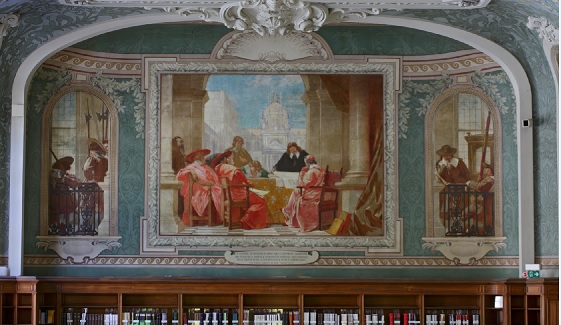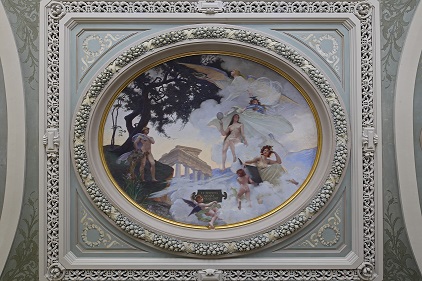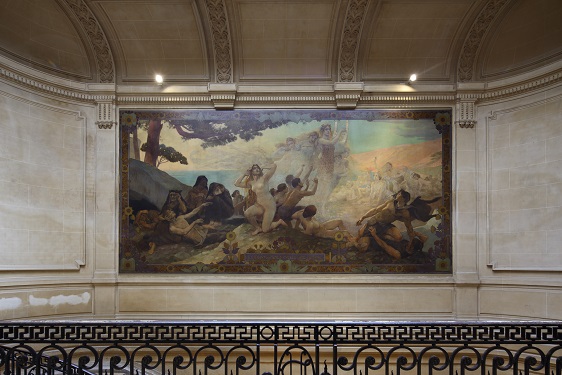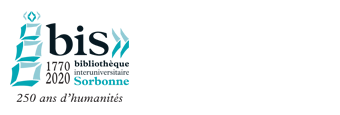The Sorbonne Interuniversity Library
The Sorbonne Library (BIS) is a specialized and academic library dedicated to literature and human sciences. It houses rich collections and offers services for both novice and experienced researchers. A virtual tour of the BIS is available.
Collections
2 millions printed volumes. 35 000 lm
![]() Books : 8 à 14 000 new titles each year ; 68% in foreign languages (English, German, Spanish, Italian, Portugese, etc.)
Books : 8 à 14 000 new titles each year ; 68% in foreign languages (English, German, Spanish, Italian, Portugese, etc.)
![]() Periodicals : : 20 000 titles ; 3 889 current subscriptions.
Periodicals : : 20 000 titles ; 3 889 current subscriptions.
![]() Data bases with distant access : More than 250 subscriptions ; 65 000 online reviews ; 300 000 e-books.
Data bases with distant access : More than 250 subscriptions ; 65 000 online reviews ; 300 000 e-books.
![]() Special collections section : 187 000 items ; 100 000 volumes prior to 1801 ; 3600 manuscripts ; 565 incunabula ; 7000 prints and photographs.
Since 2010, collections have been spread on several sites :
Special collections section : 187 000 items ; 100 000 volumes prior to 1801 ; 3600 manuscripts ; 565 incunabula ; 7000 prints and photographs.
Since 2010, collections have been spread on several sites :
![]() 40% or 13 .000 lm in distant stacks facilities rue d’Ulm and CTLES in Marne-la-Vallée generally served the day after
40% or 13 .000 lm in distant stacks facilities rue d’Ulm and CTLES in Marne-la-Vallée generally served the day after
![]() 60% or 22 .000 lm in Sorbonne served within 30-45 mn.
60% or 22 .000 lm in Sorbonne served within 30-45 mn.
The Library of Geography is in the Geography Institute
105,000 books, 12,000 maps, and plans, 5,000 atlas, etc.
Services
![]() Open-access (40,000 items),
Open-access (40,000 items),
![]() Loans,
Loans,
![]() Documents holdings (almost 100,000 per year),
Documents holdings (almost 100,000 per year),
![]() Loan and return automats,
Loan and return automats,
![]() Remote access to electronic resources,
Remote access to electronic resources,
![]() Free Wifi,
Free Wifi,
![]() Reference desks,
Reference desks,
![]() Online public catalog,
Online public catalog,
![]() Interlibrary loan,
Interlibrary loan,
![]() Photocopy and laser print area,
Photocopy and laser print area,
![]() Microforms readers and prints,
Microforms readers and prints,
![]() Public computer stations,
Public computer stations,
![]() Reader personal account,
Reader personal account,
![]() Online renewal of loans,
Online renewal of loans,
![]() Access to a part of closed stacks only for the searchers,
Access to a part of closed stacks only for the searchers,
![]() Cafeteria and restrooms inside,
Cafeteria and restrooms inside,
![]() Study work group room,
Study work group room,
![]() Online acquisition & claim requests,
Online acquisition & claim requests,
![]() Quality programm « Référentiel Marianne »,
Quality programm « Référentiel Marianne »,
![]() Opening hours 61h and 6 days a week, closed only two weeks a year, etc.
Opening hours 61h and 6 days a week, closed only two weeks a year, etc.
Permanent staff
128 / 15 students.
20 000 users.
The library can accomodate up to 500 readers in the same time.
History
Heir of the library of the Université de Paris, opened on December , 3rd 1770, in college Louis-le-Grand.
The library has been established since 1823 in the buildings of the collège de Sorbonne rebuilt from 1630 to 1642 by Cardinal de Richelieu.
![]() 1885-1902 : works to rebuild the Sorbonne by architect Henri-Paul Nénot.
1885-1902 : works to rebuild the Sorbonne by architect Henri-Paul Nénot.
![]() December 1897, the 29th : the new Library of Sorbonne is inaugurated.
December 1897, the 29th : the new Library of Sorbonne is inaugurated.
![]() 1932-1935 : 3 new levels of stacks are built.
1932-1935 : 3 new levels of stacks are built.
![]() 2009-2013 : refurbishment works.
2009-2013 : refurbishment works.
![]() 2010-2013 : during the works, the Library of Sorbonne in Sainte-Barbe.
2010-2013 : during the works, the Library of Sorbonne in Sainte-Barbe.
![]() 2012 : the library of Sorbonne changes its communication : from BIUS to bis.
2012 : the library of Sorbonne changes its communication : from BIUS to bis.
![]() November 2013, the 15th : the Library of Sorbonne re-opens to the public in Sorbonne with public spaces expanded.
November 2013, the 15th : the Library of Sorbonne re-opens to the public in Sorbonne with public spaces expanded.
The public spaces
2,100 m² (almost fully accessible to disabled people).
Budget
3,500 000 €.
The library Lobby (BIS) (Groundfloor)
Reception desk
A librarian delivers general information regarding use of the library.
Access control
To get a library card, you must fill out a form online then see a librarian to the pre-registration desks.
Pre-registration is mandatory when you open a new BIS account. If you meet the registration requirements, you can fill out this form.
Registration desks
BIS accounts may be opened by the following persons :
![]() Third-year undergraduates (L3) and above studying literature or human sciences at the Universities of Paris 1, 3, 4, 5, 7,
Third-year undergraduates (L3) and above studying literature or human sciences at the Universities of Paris 1, 3, 4, 5, 7,
![]() First-year graduate students (M1) or above studying literature or human sciences at other universities,
First-year graduate students (M1) or above studying literature or human sciences at other universities,
![]() Students studying literature or human sciences at grands établissements in France (ENC, ENS, EPHE, EHESS, INALCO, INP, Ecole du Louvre and Fondations des Sciences Politiques),
Students studying literature or human sciences at grands établissements in France (ENC, ENS, EPHE, EHESS, INALCO, INP, Ecole du Louvre and Fondations des Sciences Politiques),
![]() PhD students and individuals with doctorates in any field from any French public research or higher education institution,
PhD students and individuals with doctorates in any field from any French public research or higher education institution,
![]() Professors and researchers in any field from any French public research or higher education institution,
Professors and researchers in any field from any French public research or higher education institution,
![]() Professors and researchers from foreign universities.
Professors and researchers from foreign universities.
If you do not meet these criteria, you may be able to obtain a temporary card for research relating to documents held exclusively by the Sorbonne library.
Returns terminal
Borrowed documents may be returned at this terminal without having to go up to level 1.
The Circulation Area (1st floor)
The Information Desk
The users can ask a libarian all the information he needs, write a claim, ask for help about its holding, etc.
The Document circulation desks
Shelved documents (works from the main collection, periodicals, microforms, etc.) can be retrieved here. The closed shelves « Magasins Sorbonne » :
3 levels of underground stacks equipped with electric mobile shelves and 8 levels of closed stacks. The operations behind the circulation desk are :
- Behind the loan desk : every minutes, a library clerk prints the holdings by zone.
- Every 10 minutes, several library clerks make a round and sortings holdings.
- For each holding, the document is withdrawn.
- Back from the « rounds » : bookings are confirmed and RFID cell is added
- The documents booked by the readers are stored for 6 days according to customers’ names, before lending at the circulation desk
Two Self-checkout machines
The self-checkout machine can be used to directly borrow open-access documents and to return all documents.
Usually, you can see here a temporary exhibition of rare books about one subject or one author.
You can access from here to the rare books and special collection Room located on the 4th floor.
Special Collections Reading Room (20 seats)
Specialized research and access to shelved documents from the special collections.
The Special Collections Reading Room is open Monday to Saturday from 10 a.m. to 6 p.m. (summer hours : Monday to Friday, 10 a.m. to 6 p.m.).
All of the library’s heritage collections can be accessed here, including :
![]() Manuscripts and archives,
Manuscripts and archives,
![]() Iconographic documents (engravings, drawings, photographs, etc.),
Iconographic documents (engravings, drawings, photographs, etc.),
![]() All printed materials published before 1801,
All printed materials published before 1801,
![]() Rare and valuable modern printed materials,
Rare and valuable modern printed materials,
![]() Documents from the Victor-Cousin and Richelieu Collections.
Documents from the Victor-Cousin and Richelieu Collections.
![]() The following documents are also available :
The following documents are also available :
![]() Typed theses,
Typed theses,
![]() A collection of approximately 1,700 quick-reference works (which can be consulted only in this room), with a special emphasis on works focusing on the history of books.
A collection of approximately 1,700 quick-reference works (which can be consulted only in this room), with a special emphasis on works focusing on the history of books.
Given the special nature of the documents that may be consulted in this room, access is subject to specific restrictions.
![]() General Documents – Special Collections : Dictionaries and general reference documents.
General Documents – Special Collections : Dictionaries and general reference documents.
![]() History of the University of Paris : Reference documents relating to the history of the University of Paris.
History of the University of Paris : Reference documents relating to the history of the University of Paris.
![]() History of Books : History of manuscript books and codicology, of printed books (introductory documents on material bibliography ; catalogues of printed books indexed by printer, century, author, etc.).
History of Books : History of manuscript books and codicology, of printed books (introductory documents on material bibliography ; catalogues of printed books indexed by printer, century, author, etc.).
![]() Bibliophilia : Reference documents relating to bibliophilia (catalogues of first editions, documents on the history of bookbinding and illustrated books, catalogues of bookplates and works on private libraries, etc.).
Bibliophilia : Reference documents relating to bibliophilia (catalogues of first editions, documents on the history of bookbinding and illustrated books, catalogues of bookplates and works on private libraries, etc.).
The Jacqueline de Romilly Room
(312 seats) 62 x 14 meters = 613 m²
In this reading room there is an information and reference desk where a librarian can help the readers in their specialized and thematic researches.
The collections of the Jacqueline de Romilly room
Literature and General Documents – Periodicals
A selection of more than 100 periodicals relating to French and foreign literature, linguistics, religion, art, social sciences and multidisciplinary subjects. Periodicals and volumes dating from the last three years and current issues are available. These periodicals cannot be borrowed.
Literature and General Documents – Reference Tools
This section holds major encyclopedias, dictionaries and linguistic reference documents.
These documents are intended for direct consultation and may not be borrowed.
French Literature
The section facing the cour d’honneur offers a panorama of French literature. Organized in chronological order, the documents in this section include collections of scholarly publications and critical reviews relating to literary documents or periods.
All of these documents may be borrowed.
General Documents
This category includes reference documents relating to art, religion and social sciences.
These documents are intended for direct consultation and may not be borrowed.
Literature – Reference Documents
A selection of bibliographic tools, dictionaries and syntheses relating to all types of literature.
These documents are intended for direct consultation and may not be borrowed.
Bibliothèque de la Pléiade
The complete Bibliothèque de la Pléiade, including the various re-editions. Open-access volumes in this collection may not be borrowed. Literary Theory
A selection of more than 400 volumes relating to poetics, literary theory and criticism, rhetoric and the different approaches to genres and texts. All of these works may be borrowed.
Comparative Literature
In addition to two complete collections of Bibliothèque de Littérature Générale et Comparée and Perspectives Comparatistes, this section includes a selection devoted to methodology. All of these documents may be borrowed. The paintings you can see in this room
Marcel-André Baschet, Richelieu Examining the Plans for the Sorbonne, 1900, 350 cm x 900 cm.

- Marcel André Bachet "Richelieu examinant les plans de la Sorbonne"
- Photographie Patrick Muller
Cardinal de Richelieu was the dean of the College of Sorbonne when he commissioned Jacques Lemercier to rebuild the college’s medieval structures in a classical style.
Jean-Paul Laurens, Francis I Visiting the Workshop of Robert Estienne. This fresco evokes the visits that Francis I and his sister, Marguerite de Valois, made to the workshop of the printer Robert Estienne on Rue St. Jean-de-Beauvais.
Guillaume Dubufe, Et Scientia Quoque Poesis Erit. This tondo echoes the allegories featured around the great staircase and expresses the connection between science and poetry.

- Guillaume Dubufe "Et scientia Quoque Poesis Erit"
- Photographie Patrick Muller
Henri-Paul Nénot, Monographie de la nouvelle Sorbonne. This 19th century work, which offers an overview of the three main phases of the Sorbonne’s history, underscores the continuity between the former College of Sorbonne, the reconstruction of the college initiated by Cardinal Richelieu, and the institution as we know it today. It features the plans of the college’s buildings at these three points in time and pays tribute to the individuals responsible for the college’s renovation in the 19th century : the architect Henri-Paul Nénot and Vice-Rector Octave Gréard.
If you get out by the center of the room...
The former main staircase « Escalier d’honneur »
It was used before the refurbishment as the main access to the library.
The three frescoes surrounding the great staircase offer a series of allegorical representations that continue on the ceiling of the Jacqueline de Romilly Room.
The paintings on the left is…Georges-Antoine Rochegrosse, Science,
on the center…Georges-Antoine Rochegrosse, The Muses’ Song Rousing the Human Soul,

- Georges-Antoine Rochegrosse "Le chant des muses éveille l’âme humaine"
- Photographie Patrick Muller
on the right…Georges-Antoine Rochegrosse, Dream.
Microforms room (5 seats)
Three of the readers of microforms (fiche and film) can make copies, and two for film and fiche are machines for reading only, are available in this room, in self-service.
The Lounge or Cafeteria Room (19 seats)
The readers can drink and eat only in this area.The public of the library appreciates very much this area. Reservable Study Room and work group Room (8 seats)
This eight-person study room can be reserved for two hours by third-year undergraduates (L3) and graduate students (M).
The Numa-Denis Fustel de Coulanges Room (40 seats)
In this reading room ther is an information and reference desk where a librarian can help the readers in their specialized and thematic researches.
The collections of the Fustel room
Antiquity and the Middle Ages – Periodicals
A selection of 120 periodicals focusing on the Antiquity and the Middle Ages. Periodicals and volumes dating from the last three years and current issues are available. Antiquity (some 15,000 works in the fields of the Sciences of Antiquity and the Middle Ages)
The Antiquity collection is divided into the following subject areas : Ancient history, Languages of Antiquity, literary sources (collections including Budé, Loeb Classical Library, Cambridge Classical Texts and Commentaries, etc.), epigraphic and papyrological sources, iconography and archeology.
Many open-access volumes available in this room may be borrowed.
The Middle Ages
For the medieval period, selected sources include : MGH, Sources Chrétiennes and Corpus Christianorum.
The research collection includes reference works in French and English, research methodology, major monograph collections, textbooks, academic publications, dictionaries and encyclopedias, bibliographies, etc.
Recently acquired works in these areas are showcased here.
The Ernest Labrousse Room (40 seats)
In this reading room there is an information and reference desk where a librarian can help the readers in their specialized and thematic researches.
In this room you have another Self-checkout machine which ccan be used to directly borrow open-access documents and return all documents.
The collections of the Labrousse Room
Modern and Contemporary History – Periodicals
A selection of 140 periodicals covering the modern and contemporary periods. Periodicals and volumes dating from the last three years and current issues are available.
Modern and Contemporary History
Some 15,000 works covering French history, the general history of Europe, European countries and other continents, historiography and world history, for the modern and contemporary periods : reference works in French and the language of the country concerned, large collections of research-level monographs, academic publications, original sources, etc.
In addition to this selection, a collection of dictionaries and biographical catalogues is also available.
Recently acquired works in these areas are showcased here.
The photocopy and print Room
3 machines are available to copy in black and white (9 cents per page), 1 in color (12 cents per page). Print costs 4 cents per page.
The Vladimir Jankelevitch Room (2 seats)
In this reading room there is an information and reference desk where a librarian can help the readers in their specialized and thematic researches.
The collections in philosophy of the Jankélévitch Room
Periodicals
The last three years of 250 periodicals are freely accessible. Two computer terminals also provide access to online periodicals (digital-only periodicals and periodicals that are not stored on-site but exist in digital format for the current year).
New acquisitions
The most recently acquired philosophy books are presented on a rotating basis for 15 days and can be consulted directly before
they are shelved. Each year, the library acquires 2,000 philosophy-related documents, of which approximately one-third are in
French. These documents cannot be borrowed before they are shelved.
The Aristote Room (opened in october 2014) (12 seats)
About 7,500 monographies in philosophy (arranged by authors, subjects and geographic areas).
The research Room (10 seats)
May be reserved only by Ph. D. students.
The Training Room
Equipped with computer workstations, this room may be used for reader workshops hosted by the library or it may be reserved for academic exercises requiring use of the library’s documentary resources.
Library catalog : print records for many old materials, will be online in 4 or 5 years.
The Henri-Paul Nénot Room (16 carrels)
Sixteen carrels which may be reserved only by professors and researchers. This room is opened until 10 p.m. all year long.
On the library BIS :
The Sorbonne is due to reopen its historic library in Autumn 2013 after three years of renovations. While the early stages of the works aimed to maintain space for the collections, the later stages clearly set out to increase capacity for readers, especially researchers. While there can be no question of reducing the library’s key role in offering its collections to readers, the "Sorbonne 2013" project nevertheless aims to develop a multi-faceted approach with a view to reopening later in the year. »
Created in the second half of the XVIIIth century, the Paris university library, now called Sorbonne, always defined itself by a demanding policy of stock improvement. It seemed necessary to update this policy and to inform about it. The stock tradition on the one hand, the tasks of the library and the users’ needs on the other hand are the two foundations of the plan which wants to favour useful to search in humanities publications. In that general context acquisitions are largely opened to foreign production (more than 60 %). A particular attention is given to great scholarly bookstocks bought systematically and to serials just as to sources and reference works. The criteria for selection try to favour the setting-up of an homogeneous bookstock qualified to collect the most solid, the newest and the most lasting books.
 The Sorbonne Interuniverty Library (BIS)
The Sorbonne Interuniverty Library (BIS)
